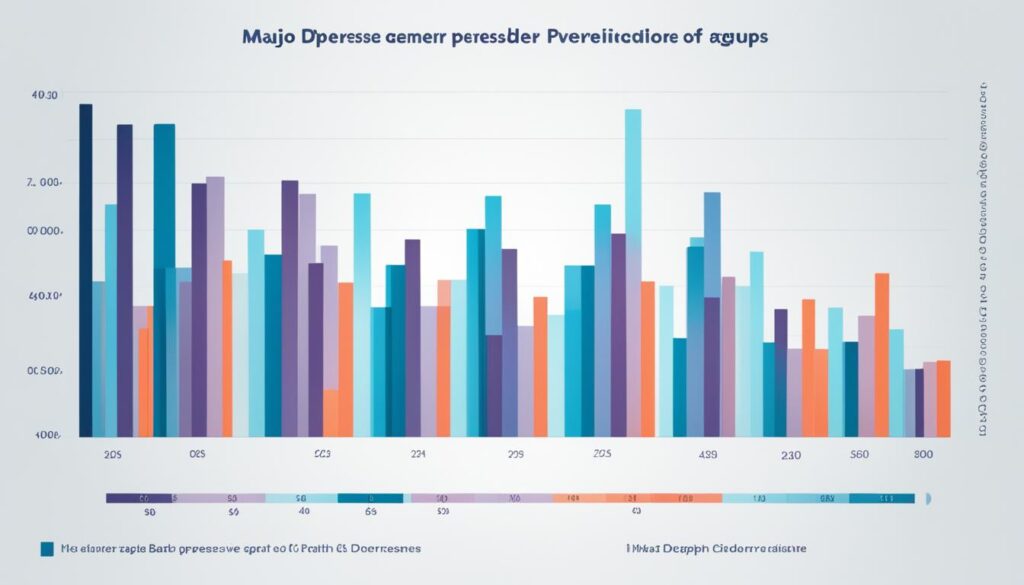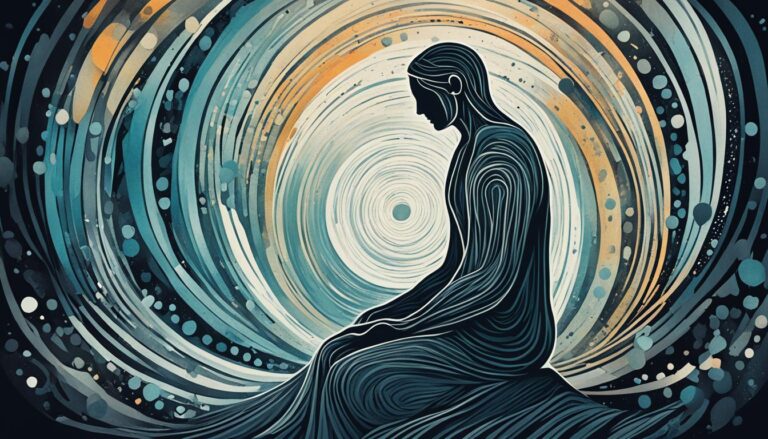Major Depressive Disorder (MDD) affects millions worldwide, with one in six people facing a major depressive episode. It’s not just feeling down; it’s a serious mental health issue. Knowing about depression helps us see how it changes lives.
It’s not a short-term mood change or a sign of weakness. It’s a condition that needs help from experts.
In the U.S., about 16 million adults deal with clinical depression every year. Symptoms can touch on feelings, thoughts, and even physical health. Things like biology, psychology, and social factors can make someone more likely to get depression.
But, there’s hope. Changes in lifestyle, antidepressants, and therapy can help. For more on how to cope, check out this helpful article.
Key Takeaways
- Major depressive disorder affects approximately 264 million people worldwide.
- Symptoms must persist for at least two weeks for a depression diagnosis.
- Biological, psychological, and social factors play roles in depression risk.
- Effective treatments combine medications and therapy.
- Understanding depression can help in recognizing its seriousness.
What is Major Depressive Disorder?
Major depressive disorder (MDD) is a serious mental illness. It brings deep sadness that makes it hard to function normally. It can start at any age, but it’s most common in adults.
To be diagnosed with MDD, you must have at least five symptoms for two weeks. One of these symptoms must be feeling sad or not enjoying things, known as anhedonia.
Symptoms of depression include feeling worthless, trouble sleeping, changes in eating, feeling tired, and thinking about harming oneself or suicide. It’s important to know the difference between MDD and other types of depression. MDD can be caused by big life events or genetics. Getting help quickly is key; treatment often includes therapy and medicine. Early treatment can make a big difference in how well someone can live with it. Learn more about finding the right support for Major depressive disorder at this resource.
About 29% of adults have had depression at some point, with 18% currently dealing with it. Depression often goes hand in hand with other health issues like diabetes and heart disease. This makes treatment harder.
Genetics also play a part, as seen in identical twins who often both have MDD. Knowing this helps us understand and support those with MDD better.
Symptoms of Depression
Major depressive disorder has many symptoms that can really change how someone lives. It’s important to know these symptoms to get help early and find the right treatment. Depression’s symptoms are emotional, physical, and cognitive, each playing a key role in how it shows up.
Emotional Symptoms
Depression often brings feelings of sadness, hopelessness, and being easily annoyed. People may feel empty or guilty, which makes things worse. It’s key to notice these feelings because they change how you feel, act, and talk to others.
Physical Symptoms
Depression also has physical signs. People might feel very tired, eat differently, and sleep poorly. Some get restless, while others feel very slow and tired. These signs can make daily life hard and lower your energy and motivation.
Cognitive Symptoms
Depression can make it hard to focus, make decisions, and think about death or suicide. These thoughts can hurt your self-esteem, making you see yourself in a bad way. Understanding these thoughts shows how depression affects you fully, highlighting the need for a complete treatment plan.
Causes of Major Depressive Disorder
Major depressive disorder has many causes. Knowing what causes it helps us find better ways to treat it.
Biological Factors
Biological factors are key in causing major depressive disorder. Our genes play a big part in making us more likely to get it. About 30% to 50% of getting depression comes from our genes.
Research has found over 100 genes linked to depression. Also, our brain chemicals like serotonin and dopamine help control our mood. If these chemicals are off balance, it can make us more likely to feel depressed.
Psychological Factors
Our thoughts and past experiences also affect depression. People who have gone through trauma might see the world in a negative way. This can make them more likely to get depressed.
Not being good at handling stress can also make things worse. Knowing this helps doctors find the right treatment.
Socioeconomic Factors
Our economic situation can really affect our mental health. Being poor, feeling lonely, or not having good healthcare can make depression more common.
Living alone or not having friends can be hard, especially for older people. Stressful events like losing a job or fighting with a partner can also trigger depression. Knowing this helps us find ways to prevent and treat depression.
Risk Factors for Developing Depression
Knowing what increases the chance of getting depression is key. These factors include genetics, environment, and personal history.
Genetic Predisposition
Genetics play a big part in getting depression. If your family has had depression, you’re more likely to get it too. Studies show that twins are more likely to both get depression if they share the same genes.
This shows that genes matter a lot. It’s important to know about your family’s history with depression.
Environmental Influences
Being in tough situations can make you more likely to get depression. Things like abuse, neglect, or stress can be big risks. These can make people more prone to depression, especially if they’re already vulnerable.
Knowing about these risks helps us prevent and treat depression better.
Personal History
Having had depression before makes it more likely to happen again. If you’ve been depressed before, you’re at higher risk. This is especially true if you faced stress early in life or didn’t get the right treatment.
Staying alert and getting the right treatment can help reduce these risks.
Learning about the link between ADHDand depression helps us understand these risks better. This can lead to better ways to manage and treat them.
Major Depressive Disorder: Understanding Depression
Major depressive disorder (MDD) affects millions of people every year. In 2021, over 8.3% of U.S. adults had a major depressive episode. It’s important to know the signs, causes, and how it affects society.
People with clinical depression have at least five specific symptoms for two weeks, as per the DSM-5. These symptoms include feeling sad, tired, guilty, and changes in sleep or eating. Spotting these signs early helps in getting help.
Knowing about MDD helps reduce stigma. It encourages people to get help, creating a supportive circle for those struggling. It’s key to know the difference between MDD and other depressions like dysthymia for correct diagnosis and treatment.
Understanding depression means knowing what causes it. Biological, psychological, and environmental factors play a role. Dealing with these factors can help patients get better support.
| Type of Depression | Duration | Symptoms |
|---|---|---|
| Major Depressive Disorder | At least 2 weeks | Severe mood changes, suicidal thoughts |
| Persistent Depressive Disorder | 2 years or longer | Chronic mild depression, fatigue |
| Disruptive Mood Dysregulation Disorder | Ongoing | Frequent tantrums, irritability |
| Seasonal Affective Disorder | Seasonal | Low mood during winter months |
Learning about these disorders helps people recognize symptoms and get help. Knowing the differences between depressions helps in creating specific treatment plans. With ongoing mental health awareness, those with major depressive disorder can find recovery.
Epidemiology of Major Depressive Disorder
In 2021, about 21.0 million U.S. adults had at least one major depressive episode. This means about 8.3% of all adults in the nation faced this issue. Women were more likely to be affected, with 10.3% experiencing depression, compared to 6.2% of men.
This difference could be due to hormonal changes, social stress, and lifestyle choices. Age also matters in depression rates. Young adults aged 18-25 had the highest rates, at 18.6%. Those identifying as two or more races had even higher rates, at 13.9%.
This shows we need to focus on these groups for better support. Sadly, 14.5 million U.S. adults had major depressive episodes that severely impacted their lives. This is about 5.7% of all adults.

Looking at treatment, 61.0% of those diagnosed with MDD got help in the past year. But, 39% didn’t seek help at all. Among teens, 5.0 million aged 12-17 felt depression in 2021, which is 20.1% of this group.
Girls in this age group were much more likely to feel depressed, at 29.2%, compared to boys at 11.5%. These numbers highlight the importance of addressing mental health issues.
Understanding what causes depression is key to tackling this issue. For more info on depression causes, check out the link here.
| Age Group | Prevalence Rate | Treatment Received |
|---|---|---|
| Adults (18 and older) | 8.4% | 61.0% |
| Adolescents (12-17) | 20.1% | 40.6% |
| Young Adults (18-25) | 18.6% | 74.8% |
| Adults with Severe Impairment | 5.7% | 74.8% |
The Diagnosis Process for Depression
Diagnosing depression is a detailed process. It starts with a clinical evaluation. Healthcare professionals look at the patient’s mental and physical health, and the symptoms they have. They might also talk to family or friends to learn more.
Clinical Evaluation
The clinical evaluation is key to diagnosing depression. It includes several steps to fully understand the patient’s situation. These steps are:
- A detailed mental health history
- Physical examination to rule out other health issues
- Assessment of emotional, behavioral, and cognitive symptoms
Healthcare providers use the DSM-5 criteria for their evaluations. They look for things like melancholic, atypical, or seasonal patterns. This shows how complex depression can be.
Standard Screening Tools
To help diagnose depression, screening tools are used. These tools help find out how severe the depression is and what treatment is needed. Some common tools are:
- Patient Health Questionnaire-9 (PHQ-9)
- Hamilton Rating Scale for Depression (HAM-D)
- Beck Depression Inventory (BDI)
These tools check for symptoms like sadness, fatigue, and losing interest in activities. Using these tools makes diagnosing depression more accurate. It helps create a treatment plan that fits the individual’s needs. For more info on recognizing symptoms, visit this resource.
Treatment for Depression
Treatment for depression includes many approaches to help ease symptoms and improve life quality. People with major depressive disorder (MDD) can look into pharmacological treatments, psychotherapy, and new therapies.
Pharmacological Treatments
Medications are often the first step in treating MDD. Doctors often prescribe antidepressants like SSRIs because they work well. It can take weeks for these medications to help, and doctors suggest taking them for at least six months to prevent depression from coming back.
About 30% of people might not get better with different antidepressants, which is called treatment-resistant depression. Recently, the FDA approved a new drug called brexanolone (Zulresso) for postpartum depression. This is a big step forward in treating depression with medication.
Psychotherapy Options
Psychotherapy is key in treating depression. Techniques like cognitive-behavioral therapy (CBT) help patients change negative thought patterns. Group therapy is also helpful, offering support and learning from others who understand what you’re going through.
Studies show that combining therapy with medication can greatly improve life quality for those with depression.
Innovative Treatments
New treatments are being developed, offering hope for managing major depressive disorder. Electroconvulsive therapy (ECT) has been around for over 70 years and is very effective for some people. New treatments like esketamine, a nasal spray that works quickly, and research on psychedelics like psilocybin are exciting.
Techniques like transcranial magnetic stimulation can change brain communication with fewer side effects than ECT. Deep brain stimulation is being studied as a future treatment, possibly acting like a “pacemaker for your mood.” Researchers are also looking into new medications, such as SAGE-217, for those who don’t respond to other treatments.
| Treatment Type | Description | Effectiveness |
|---|---|---|
| Antidepressants | Medications like SSRIs are frequently prescribed. | Effective for many, requires time to take effect. |
| Cognitive-Behavioral Therapy | Focuses on addressing cognitive distortions. | Proven effective in numerous studies. |
| Electroconvulsive Therapy | Involves electrical stimulation to the brain. | Highly effective for treatment-resistant depression. |
| Esketamine | Nasal spray offering rapid relief. | Promising results within hours or days. |
| Deep Brain Stimulation | Involves implanting electrodes in the brain. | Potential for effective future treatments. |
Coping with Depression
Coping with depression involves many strategies that can greatly improve well-being. Self-care is key in managing major depressive disorder symptoms. Daily routines and regular physical activity can boost mood. Mindfulness practices also help reduce depression symptoms.
Studies show that exercise, like brisk walking or yoga, significantly helps with depression. It improves emotional health.
Self-Care Strategies
Effective self-care is crucial for dealing with depression. Here are some strategies to consider:
- Establishing a balanced diet: Eating nutrient-rich foods can improve mood.
- Maintaining sleep routines: Good sleep is key for emotional balance. A consistent sleep schedule is advised.
- Practicing mindfulness: Mindfulness techniques can lessen depression and anxiety symptoms.
- Spending time in nature: Being in nature lowers stress, anxiety, and depression.
Support Systems
Having a strong support system is vital for those with depression. Family and friends offer essential emotional support. Joining support groups can also help, creating a community of understanding.
Feeling lonely or isolated can make depression worse. Support systems are key for emotional healing. Being social, whether at casual events or group activities, is important. It helps counteract the isolation that comes with depression.
Managing Depressive Symptoms
Managing depressive symptoms requires a mix of lifestyle changes and professional help. These steps can boost your well-being and help you deal with depression. It’s key to know and use these methods to fight sadness and loneliness.
Lifestyle Changes
Changing your lifestyle can help a lot with depression. Here are some important steps:
- Engaging in regular exercise: Try to get at least 30 minutes of activity every day. Walking, dancing, or martial arts can make you feel better and give you more energy.
- Improving sleep hygiene: Make sure you get enough sleep. It’s crucial for your mental and physical health when you’re dealing with depression.
- Practicing mindfulness: Meditation or deep breathing can stop negative thoughts and help you feel more stable.
- Connecting socially: Keeping up with friends and family helps fight off feelings of loneliness.
- Setting achievable goals: Having realistic goals can make you feel good about your progress and boost your confidence.
Professional Support
Getting help from professionals is very important for dealing with depression. They offer the guidance and support you need to get better. Here are some ways to get help:
- Therapy or counseling: Seeing a therapist regularly can help you change negative thoughts and behaviors.
- Medication: Sometimes, antidepressants are needed to help with symptoms, along with therapy.
- Support groups: Being in a group can make you feel like you’re not alone and help you cope better.

Therapy for Depression
Effective therapy is key in treating depression. Cognitive behavioral therapy and group therapy are top choices because they work well and offer support.
Cognitive Behavioral Therapy
Cognitive Behavioral Therapy (CBT) is a top method for dealing with depression. It helps change negative thoughts that make you feel down. Studies show it helps people think more positively, which boosts their mood.
CBT usually lasts from 8 to 16 sessions. It’s a quick way to get better. Clients learn to question their thoughts and find ways to cope with daily life. For more info on treating depression, check out this resource.
Group Therapy
Group therapy creates a supportive space where people can heal and connect. It lets people share their experiences, building a community. Experts lead these groups, helping everyone grow and find ways to deal with depression.
Being in a group helps reduce loneliness and offers new ways to think about getting better. People often feel more confident and understood, which helps their mental health.
| Type of Therapy | Main Focus | Benefits |
|---|---|---|
| Cognitive Behavioral Therapy | Change negative thought patterns | Improved emotional regulation |
| Group Therapy | Support through shared experiences | Reduced feelings of isolation and improved social skills |
Depression Support
Getting the right support is key for those fighting mental health issues. There are many community resources available, like local mental health groups and wellness programs. These offer connections that help reduce feelings of loneliness and encourage people to get help.
Community Resources
Community resources are crucial for supporting those with depression. They include:
- Local mental health clinics that offer therapy and counseling.
- Support groups where individuals can share their stories and feelings.
- Wellness programs that promote physical activity and mindfulness for better health.
Using these resources helps people recover by making them feel part of a community. They understand and share the same struggles.
Hotlines and Helplines
Hotlines and helplines are great for immediate help. They offer expert advice for those in crisis. Some important ones are:
- National Suicide Prevention Lifeline: 1-800-273-TALK (8255) is available 24/7.
- The Crisis Text Line lets users text for help, offering privacy and ease.
- Local helplines that meet specific community needs and languages.
These services are vital for quick help and access to mental health experts. They make sure people get the support they need right away.

Distinguishing Depression from Grief
It’s key to know the difference between grief and depression for emotional health. Both can make you feel sad and make you want to be alone. But, depression is different because it lasts a long time. Knowing the differences helps people find the right way to cope.
Grief comes in waves and can change how you feel. Depression makes you feel sad all the time. Spotting these differences is important for getting the right help.
Common Symptoms Comparison
Grief and depression share some symptoms, so it’s vital to look closely at the differences. Here are some key differences:
| Symptom | Grief | Depression |
|---|---|---|
| Emotional Pain | Comes in waves, can include moments of joy | Constant and pervasive feelings of sadness |
| Withdrawal | Selective withdrawal, sometimes social | Consistent withdrawal from all activities |
| Sleeping Patterns | May have trouble sleeping, but not always | Insomnia or excessive sleeping |
| Concentration | Often intact, can distract at times | Persistent difficulty focusing |
| Thoughts of Self-worth | May feel guilt for moving on | Often involves deep-seated feelings of worthlessness |
When to Seek Help
Knowing when to get help is crucial for your mental health. See a doctor if you feel bad for more than two weeks or it affects your daily life. If you feel hopeless or don’t enjoy things you used to like, get help.
Getting help early can make a big difference. It can help you deal with depression or grief, or even prolonged grief disorder.
Conclusion
Major Depressive Disorder (MDD) is a complex mental health issue that affects many people’s lives. It’s important to know its symptoms, causes, and treatment options. Millions worldwide face this disorder, showing we need more awareness and education.
Research shows that getting the right help can make a big difference. There are many ways to treat it, like therapy, SSRIs, and newer methods like TMS and esketamine. These options give hope to those fighting depression.
Understanding depression is key to fighting its stigma and helping people seek help. By focusing on mental health, we can support those with MDD on their path to recovery and better well-being.


